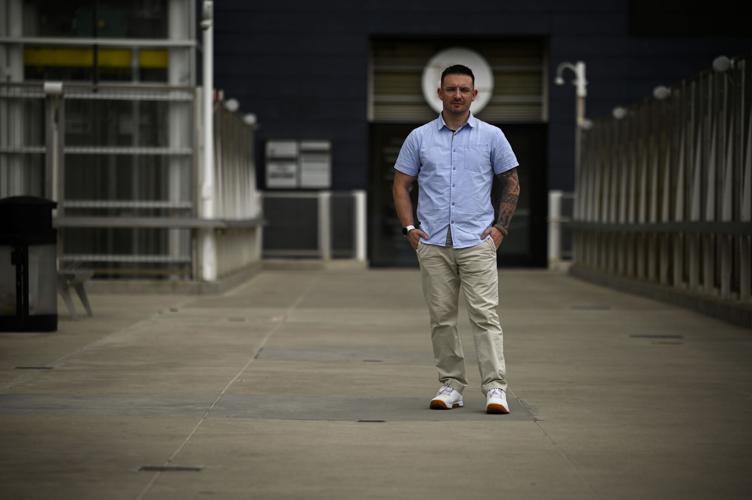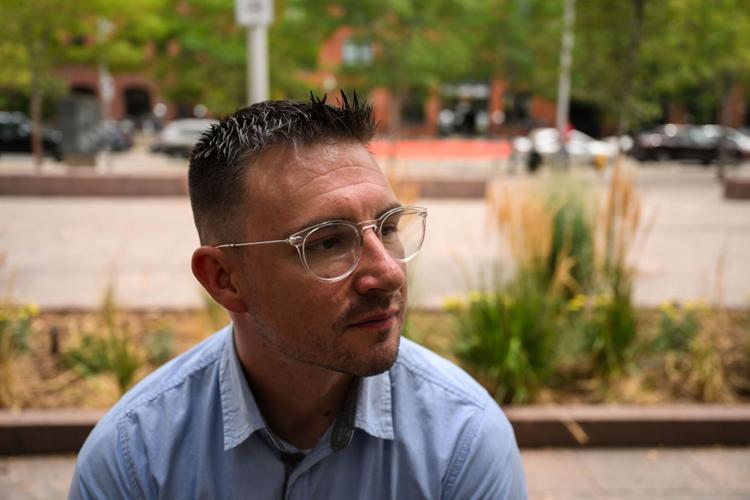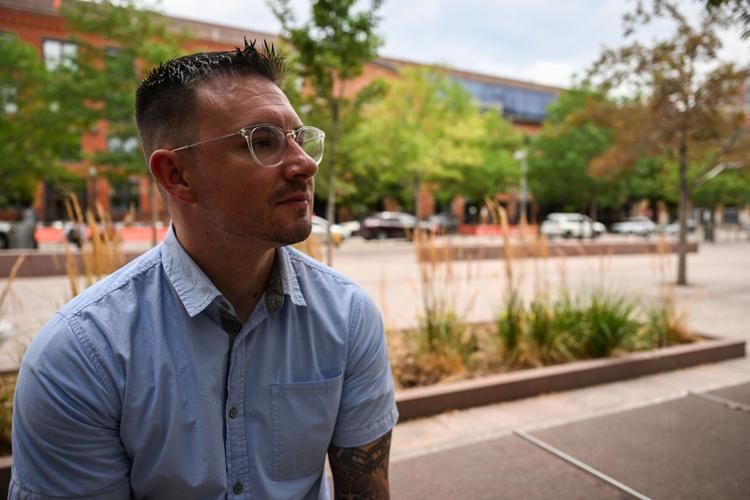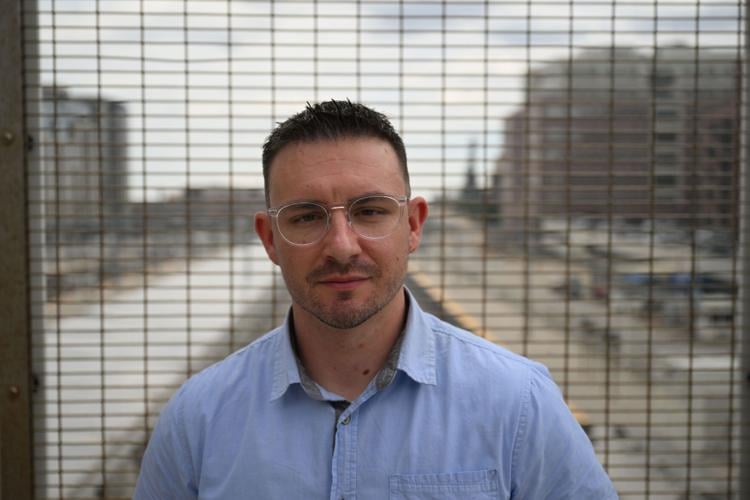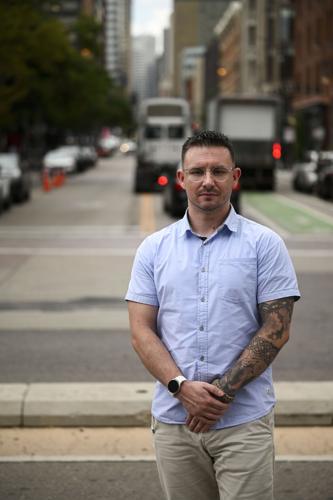‘All I ever wanted was a fair trial’: Colorado man Clayton Hood cleared in sex assault
Clayton Hood stood in the Douglas County Courthouse on June 6, breathing hard, his heart pounding, waiting for the judge to speak. The jury had just decided his case for a second time.
Then came the words: “not guilty.”
Suddenly, everything seemed to blur. After being cleared on the first charge of sexual assault on a child by a person in a position of trust, he didn’t hear the judge say he was also found not guilty of the second count of unlawful sexual contact.
He didn’t hear the cheers from his supporters in the courtroom.
The only sound he heard was his weeping.
Almost four years to the day before, on June 17, 2021, in the same courthouse, a different jury returned a different verdict in his first trial on the same charges, declaring him guilty of raping the 15-year-old daughter of his cousin with whom he lived.
Hood wept then, too, but in shock and anguish. His defense attorney, Margaret Steele, stood next to him, also in shock. Hers, though, was at a judicial system she said had gone terribly awry.
The two trials of Clayton Hood, now 34, offer a troubling look at how a district judge allowed prosecutors to misuse a Colorado law designed to protect sexual assault victims, cherry-picking DNA results, and excluding evidence that did not fit their narrative in a murky case.
Hood was sentenced to eight-years-to-life in prison for a crime he has said he did not — could never — commit.
The Colorado Court of Appeals last year overturned the original convictions and ordered a new trial after determining the jury had been misled.
Before the second trial, though, Douglas County prosecutors offered him a plea deal on a misdemeanor charge with credit for time served. He said no.
DNA from an unknown male was excluded from the original trial evidence
In early June 2021, just days before Hood was to stand trial for the first time, the Douglas County district attorney’s office asked District Judge Patrica Herron to keep the jury from hearing that the girl’s rape exam at the hospital revealed male DNA on her external genitalia near her vagina.
It was not Hood’s DNA, and the identity of the owner and the origin of the DNA remain unknown.
The Denver Gazette is withholding the name of the alleged victim as well as other family members to protect her identity. Now 20 and living in another part of the state, she and her family declined to comment.
Herron did not respond to a request for comment. The prosecutors and public defenders involved declined to comment. The case is now sealed. Information for this story came from interviews with Hood, his first defense attorney, DNA and legal experts, the first trial transcript, and other court documents. The second trial transcript was unavailable.
By invoking Colorado’s rape shield law, the prosecution argued in a pre-trial hearing that the presence of male DNA on the girl’s genitalia could imply the girl was sexually active and was potentially harmful to her.
Steele countered that she did not intend to damage the girl’s reputation or introduce any testimony about her sexual history. She said she just wanted the jury to hear all the evidence.
The judge sided with the prosecution.
Herron ruled the defense could not even “leave the impression” someone else’s DNA was found near the teenager’s vagina.
So, the jury heard a heart-wrenching and detailed account from the alleged victim about an early morning assault after Hood, smelling of alcohol, climbed into her bed.
Hood did not testify.
There was also evidence introduced by the prosecution that DNA from Hood had been found on the girl’s underwear.
But testimony from Colorado Bureau of Investigation forensic experts explained that there were at least three other DNA contributors on the underwear: the girl’s, two unknown males’, and Hood’s. Hood’s sample was the smallest. None of the samples contained sperm.
The sheets from the bed, while collected, were not tested for DNA.
(This case is not connected to the ongoing DNA testing scandal at the CBI lab.)
The CBI experts testified that DNA can be transferred onto clothing when people live in the same house. In addition to Hood and the girl’s father, another adult male family member was living in the home. Yet none of them were asked for DNA samples, nor was the girl’s teenage boyfriend.
Similarly, the tiny amount of the girl’s DNA found on a portion of Hood’s shorts could have also been transferred indirectly sometime prior, the defense argued.
Steele speculated there was no proof the alleged victim had sex with anyone that morning, let alone Hood.
While the jury did hear that Hood’s DNA was not found in or on the teenager’s body despite allegations of forceful intercourse without a condom for up to an hour, the prosecution explained it away:
Hood’s DNA might have been naturally expelled or washed off when the girl took a shower after the assault, the prosecutor said, adding that its absence did not mean the rape did not happen.
“If you believe her, he’s guilty,” Deputy District Attorney Nathan Marsh said in his closing argument, according to the trial transcript. “You can be done right here.”
It worked.
The jury voted to convict without ever knowing there was someone’s DNA found on her body that had not been washed away.
The accuser’s testimony differed sharply from Hood’s version of events
Clayton Hood moved into his cousin’s Castle Rock home in the fall of 2019. The two men had always been close; like brothers, they would say.
Hood’s parents died, six months apart, when he was a boy. His mother died of an accidental overdose, he said, and his father of liver failure. Afterward, his cousin’s parents took him in.
At the age of 18, Hood joined the U.S. Navy, served for six years, and received several commendations. In 2016, he began work for defense contractor Raytheon Technologies, now part of RTX Corporation. He spent nearly two years in Afghanistan, he said.
He married at 20 and his son was born a year later. But by 2019, the marriage was ending, and there were fights over visitation. “I was going through a hard time,” he would later say.
It was no secret that he struggled with depression and post-traumatic stress disorder and tried to kill himself while living in Oklahoma. Hood’s cousin suggested he should be near family rather than alone.
Hood’s cousin, also divorced, urged him to move to Colorado and live with him, his daughters, and another male family member.
Hood’s room was on the first floor. His cousin’s 15-year-old daughter’s bedroom was in the basement.
At trial, her boyfriend testified she was not happy living with her father. The defense speculated in opening statements that she may have wanted to find a way out of his house.
On March 11, 2020, Hood, then 29, his cousin, and the other male relative living in the house went to The Stampede nightclub in Aurora. Hood said he got very drunk. His companions later testified that Hood was “buzzed” but coherent.
Hood said he went to his room after returning home, threw up, and then passed out.
But his cousin’s daughter told a very different version of events:
She testified that around 2:30 a.m., she awoke to find someone in her room. She first thought it was her boyfriend and kissed him on the cheek and hugged him.
“Do you know who this is?” she said the man asked.
When she said her boyfriend’s name, he said “no.” That is when, by the light of her phone, she said she recognized Hood.
At trial, a juror submitted a question about whether it was normal for her boyfriend to come over in the middle of the night. The judge ruled that the question could not be asked.
The girl testified that Hood sat on her bed as she drifted back to sleep. When she awoke again, she said he was on his side next to her, holding her body close. He began fondling her and tugging at her underwear even as she told him to stop, she said.
He then forced intercourse with her, she said. It lasted about an hour, she testified, breaking down in tears.
He said it was a mistake and threatened to kill himself if she told anyone, she testified.
After Hood left her room, she said she took a shower around 5 a.m., texted her boyfriend that she had something to tell him, and left for school.
Hood said in an interview that he never went downstairs.
He said he awoke around 9 a.m. to find an angry text from his estranged wife saying he could not see their son. Despondent, he tried to hang himself, but the belt broke.
Then, still reeling, things got worse. His cousin called, accusing him of rape. He said he drank household cleaner. When police found him, he still had the broken belt around his wrist from the first attempt and was lying face-down in vomit from the second, barely alive.
The girl told her boyfriend, his mother, and her parents that Hood had assaulted her, but also said she didn’t want to get him in trouble, according to the trial transcript.
Her father picked her up from school and took her to the Castle Rock Police Department before taking her to the hospital. While with the police, her father called Hood on a recorded line and said there was video footage from the house of him sneaking downstairs and an audio recording from his daughter’s room.
Neither was true. It is a trick police sometimes use to elicit a confession.
Hood told his cousin repeatedly that he did not remember anything after passing out. While on the phone, he said he even checked his body and found no semen to indicate he had previously had sex.
He never confessed but did say: “If that’s what happened, that’s what happened.”
Hood would later explain it was not meant to be an admission but rather a sarcastic comment to end the call.
But it stuck.
After being released from the hospital following his suicide attempt, Hood was arrested, tried, convicted, and sent away to Bent County Correctional Facility, a private prison, potentially for the rest of his life.
Colorado Appeals court says jury received incomplete and misleading evidence
On March 14, 2024, the Colorado Court of Appeals concluded the district court had “abused its discretion” by excluding DNA evidence.
More than two years into his eight-years-to-life sentence, Hood was granted a new trial.
In Colorado, a person given an indeterminate life sentence, typically a sex offender, must serve the minimum and can be eligible for release after fulfilling certain conditions.
Hood said he was told he must acknowledge his crime and take rehabilitative classes to be eligible for future parole. He refused, saying he would not admit to a crime he did not commit, so he knew he was potentially facing a life sentence.
He remembers a moment of despair in late 2023 when he saw a row of elderly prisoners in wheelchairs and realized it could someday be him.
In the strongly worded opinion, the appeals court concluded Judge Herron misapplied the state’s rape shield law to keep the jury from hearing that DNA from someone other than Hood had been found on the girl’s external genitalia.
The three-judge panel said the importance of the withheld evidence outweighed the danger of harm to the alleged victim. It further said the source of the DNA was unknown and could have been non-sexual, so the rape shield law did not apply.
Regardless, the DNA should have also been admitted under standard evidentiary rules, the court said.
The appellate judges also concluded that the presence of the other DNA undermined the prosecution’s theory that the only reason Hood’s DNA was not found on her body was that it had been showered away.
“The court’s ruling and the prosecution’s presentation of the evidence and the arguments gave the jury an incomplete and misleading view of material evidence and minimized the exculpatory value of the fact that Hood’s DNA was not found on (the girl’s) genitalia,” the appeals court said. The court referred to the alleged victim by her initials, which the Denver Gazette is withholding.
In addition, the judges questioned why the girl’s underwear was allowed, which showed DNA from two unknown males in addition to Hood’s.
“We fail to see why the other DNA evidence found on (the girl’s) underwear and the DNA evidence found on (her) vagina would be treated differently for purposes of the rape shield law.”
Four months later, the Colorado Court of Appeals overturned a second Douglas County case with the same judge and same prosecutor for again misapplying the rape shield law.
In that 2022 case — which did not involve a sex crime — Herron invoked the rape shield to exclude testimony that the defendant, Donald Gerle, and his partner had a history of bondage and role playing that included dominance.
Gerle was convicted of assault and false imprisonment after the woman was severely injured during what the defense contended was consensual activity that got out of hand. While not denying some culpability, the defense argued that the history of the couple’s relationship could have provided a more compelling explanation for what happened.
The appeals court agreed, but the case was further appealed to the Colorado Supreme Court, which is reviewing it.
Herron retired in 2023 but returned to the bench last year as a part-time senior judge.
Colorado rape shield law scrutinized in court’s reversal decision
Every state now has some form of a rape shield law.
The laws are designed to counteract what were once routine “fishing expeditions” by defense attorneys to bring up victims’ past sexual history and character to cast doubt on accusations.
The practice often humiliated and re-traumatized accusers and had a chilling effect of making others less likely to come forward after a sexual assault, advocates say.
In Colorado, the law has been refined over the years and now extends to civil cases, disallowing a victim’s clothing or manner as evidence to suggest consent.
However, an exception to the law exists, allowing judges to allow evidence of sexual history narrowly. It can be used to establish the source or origin of semen, pregnancy, disease, or to show the accused did or did not commit the crime, said Ian Farrell, a professor at the University of Denver’s Sturm College of Law who specializes in criminal and constitutional law.
While the rape shield law is a needed and important protection for victims, Farrell said, there are times when relevant evidence should be admitted, ensuring due process for the accused.
“The stakes,” he said, “are incredibly high on both sides.”
Clayton Hood was granted a new trial after his conviction was overturned
“Did you hear? Did you hear?” Hood’s sister was happily crying when he phoned her from prison in mid-March 2024.
Hood had no idea what she was talking about.
Hood’s first attorney, Steele, had called her a few days before to say the appellate court had granted a new trial, but Hood still didn’t know. It is unclear why he was not told immediately.
He was cautioned by the public defender who drafted his appeal that there was still a long road ahead, he said.
It didn’t matter. “All I ever wanted was a fair trial,” Hood said.
While firm numbers are elusive, legal experts estimate that anywhere from two to 10 percent of the nearly two million people incarcerated today in this country were wrongfully convicted, either because they are innocent or did not receive a fair trial.
After the reversal, Steele stated that the district attorney’s office offered Hood the opportunity to walk out of prison if he pleaded guilty to a misdemeanor, with credit for time served, and avoid a second trial. He refused, saying he would not admit to a crime he did not commit.
The second trial began June 2 before Douglas County Judge Victoria Klingensmith. This time, public defenders represented Hood. The trial lasted three days.
It was fundamentally a repeat of the testimony and arguments from the first trial, with one notable exception: Phillip Danielson, a professor at the University of Denver and a nationally recognized expert in forensic DNA science.
Called by the defense, Danielson painstakingly testified about testing, statistics, and probabilities. He said Hood’s DNA sample was the smallest of the four identified on the teenager’s underwear, so small it was considered statistically weak.
How it got there is unknown, he said, but it is not unusual to have DNA present from non-sexual transfer when people are living in the same house.
Testing is now much more sensitive than in years past, he said in an interview, so more is detected. “With extra sensitivity in today’s tests often comes more uncertainty and a greater need for caution in drawing conclusions.”
He also testified about the unknown male DNA found on the teenager’s genitalia during the hospital exam — the piece of evidence missing in the first trial.
Danielson said later that the DNA found did not necessarily mean there had been a sexual encounter. But it begged the question of how it remained if Hood’s DNA was showered away.
The jury took nine hours before finding Hood not guilty.
Freed Navy veteran starts new chapter after wrongful imprisonment
After the verdict, Hood walked out of the courthouse and collapsed on the pavement.
That first night, he couldn’t sleep, couldn’t turn off his brain. For weeks, it felt like it was all going to be snatched away.
Finally, reality hit. He was at Denver International Airport, about to fly to Arizona to visit a friend. As he passed through security, he braced for someone to stop him. No one did.
“I left the state for the first time in years without permission,” he said, awe still in his voice. “And it was the Fourth of July. It was extra significant.”
He said he is now trying to claw back the life he lost. He is living with his sister in Denver. His veteran’s benefits have been restored. He is trying to rebuild a relationship with his son, now 12, who knows he was in prison but may not know why.
“When you’re old enough, I have a story to tell you,” he said to his son. “It’s about how far you are willing to go to prove the truth.”
He is getting counseling through the Department of Veterans Affairs. He is considering a civil lawsuit. It’s not about money, he said, it is about accountability.
Hood will soon start fall classes at the Colorado Community College of Denver. He once wanted to be an engineer, but now he wants to be a paralegal, possibly attending law school someday.
And he wants to work for the defense.
Michael Karlik contributed reporting to this story.





